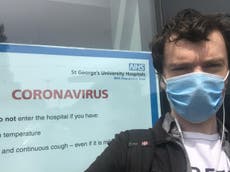South Korean authorities downplay vaccine fears after nine people die following flu shots
No reason to believe flu vaccination programme linked to deaths, says Korea Disease Control and Prevention Agency
Your support helps us to tell the story
From reproductive rights to climate change to Big Tech, The Independent is on the ground when the story is developing. Whether it's investigating the financials of Elon Musk's pro-Trump PAC or producing our latest documentary, 'The A Word', which shines a light on the American women fighting for reproductive rights, we know how important it is to parse out the facts from the messaging.
At such a critical moment in US history, we need reporters on the ground. Your donation allows us to keep sending journalists to speak to both sides of the story.
The Independent is trusted by Americans across the entire political spectrum. And unlike many other quality news outlets, we choose not to lock Americans out of our reporting and analysis with paywalls. We believe quality journalism should be available to everyone, paid for by those who can afford it.
Your support makes all the difference.South Korean health authorities have sought to downplay vaccine fears within the country following the recent deaths of nine people who had been inoculated with a seasonal flu jab.
A 17-year-old boy and a man in his 70s were reported to be among the victims, and although authorities said there was no reason to believe the deaths were linked to the vaccine, an investigation has since been launched.
"It makes it hard for us to put out a categorical statement," vice health minister Kim Gang-lip said on Wednesday.
Jeong Eun-kyeong, the director of the Korea Disease Control and Prevention Agency (KDCA), told a media briefing that the country would be pushing ahead with its nationwide vaccine programme, having found no reason to suspend it.
Coming just weeks after the rollout of the national inoculation programme was suspended over safety worries, the deaths have dominated headlines in South Korea, and are expected to further intensify vaccine concerns within the country and beyond.
Boosting public trust in vaccines has become a major global challenge this year, with the likes of Russia and China rushing to approve experimental Covid-19 vaccines before full safety and efficacy studies have been completed.
Fears have been raised that vaccine hesitancy could hamper attempts to inoculate populations and reduce the transmission of Sars-Cov-2, the virus responsible for Covid-19, thereby prolonging the pandemic.
In South Korea, officials last month announced plans to inoculate 30 million people in a bid to prevent the health system being overloaded by patients with flu and Covid-19.
However, the start of a free jab programme for around 19 million eligible people was suspended for three weeks after it was discovered that some five million doses, which need to be refrigerated, had been exposed to room temperature while being transported to a medical facility.
The nationwide rollout of flu jabs was resumed on 13 October, with 8.3 million people inoculated since then. Around 350 cases of adverse reactions have been reported.
A 17-year-old boy who died on Friday was the first death noted by officials to follow receipt of the vaccine. The boy died two days after receiving the flu shot in Incheon, near the capital Seoul.
A man in his 70s, who had Parkinson's disease and arrhythmia, was the most recent case. He died in Daegu on Wednesday, a day after receiving the flu vaccine. Daegu officials said the man had received vaccines since 2015 with no prior adverse reactions.
Stephen Evans, a professor of pharmacoepidemiology at the London School of Hygiene & Tropical Medicine, said “we certainly do not know” at this stage if the nine deaths were caused by the vaccine.
“Coincidental deaths are to be expected,” he said. “There is good surveillance in South Korea and there will be careful investigation to see whether there is a causal link. We cannot absolutely rule it out until such an investigation has been completed.”
When asked how common it was for people to die shortly after receiving a vaccine, he said: “It depends on how many are vaccinated; what their ages are; what their underlying health conditions are; how long after the vaccination took place the deaths occured.
“The first thing that is done is to see if there is some other clear condition that was the most likely cause. In principle it is usually the case that flu vaccinations are given to those who are at most risk of dying from flu. Such people, because they have underlying health conditions, are also at high risk of dying from other causes.”
The highest number of South Korean deaths linked to the seasonal flu vaccination was six in 2005, according to Yonhap news agency.
Even before the coronavirus pandemic, trust in vaccines was a growing challenge for public health bodies. The World Health Organisation identified anti-vaxx sentiments as one of the top 10 global health threats for last year.
A South Korean poll earlier this month found that 62 per cent of 2,548 respondents in Gyeonggi province, near Seoul, would not get vaccinated against Covid-19, even if a vaccine is approved, until all safety questions are fully answered.
In America, six in 10 respondents to a September Axios/Ipsos poll said they would not take a vaccine as soon as it is available, up from 53 per cent in August, and a majority said they would wait at least a few months to get a vaccine or did not plan to get one at all.
Additional reporting by Reuters




Join our commenting forum
Join thought-provoking conversations, follow other Independent readers and see their replies
Comments